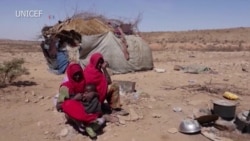As East Africa struggles through a drought, scientists say climate change may be making the situation worse as a warming planet may be altering the weather patterns that bring rain to the region.
In Somalia, the rains failed late last year. And the rains before that were meager. Livestock have died. Crops have failed.
Famine threatens Somalia for the second time this decade.
While drought is not uncommon in this dry region, it has gotten worse, Chris Funk, a climate scientist at the University of California at Santa Barbara, said.
"What we've seen over, say, the last 35 years is that the rainfall during what's called the long rains in East Africa has declined substantially," Funk said.
He added the explanation may lie in an atmospheric cycle that links East Africa and the Pacific Ocean.
WATCH: Experts: Climate change may be making drought worse
Warm, wet air rises over the western Pacific, causing rain over Southeast Asia.
On the other side of the cycle, dry air descends over East Africa. That is why not much rain falls here even in normal years.
But when the western Pacific is warmer, it pushes the whole system harder: more rain over Southeast Asia, and more dry air descending on East Africa.
More dry air means more drought.
And Funk said the ocean is getting warmer.
"The warming over the western Pacific appears to be pretty much directly related to increasing greenhouse gases in the atmosphere," he said.
Research shows that in the past, a warmer ocean meant a drier East Africa. But Funk says it is not entirely clear whether the current drying trend will continue.
"One of the things making it hard to look into the future is the fact that the story told by the global climate models, the climate change models, is pretty much the exact opposite of what we're seeing in East Africa," Funk said.
The models predict it should be getting wetter. But experts increasingly think the models may be flawed in this area.
Funk and others are working on it.
The short term is more clear. The western Pacific is still warmer than average. Which means the forecast is for a third season of disappointing rains.






